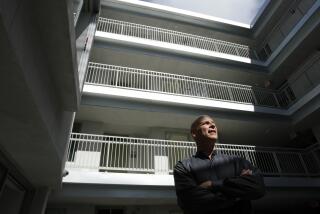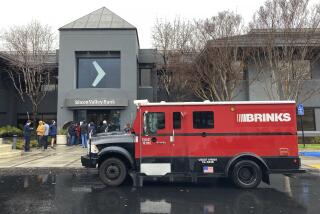Court Deals Sahni a Setback in Battle With Regulators
- Share via
American Diversified Savings Bank’s ousted chairman, Ranbir S. Sahni, was handed a setback in his battle with federal regulators Monday when an Orange County judge ruled that he had no right to take operational control of $171 million worth of real estate partnerships in which the S&L; had an interest.
The Federal Home Loan Bank Board seized the Costa Mesa-based S&L; 20 months ago after declaring it insolvent.
Sahni’s recent attempt to wrest control of the real estate partnerships from a subsidiary of the S&L;, said Superior Court Judge William F. McDonald, was a “clever ploy” to get around a regulatory decision--and a U.S. Bankruptcy Court ruling--that had barred his separately owned management company from on-site management of the properties.
McDonald noted that Sahni--who still owns 96% of American Diversified--had failed numerous times to take control of the 41 limited partnerships away from the subsidiary, American Diversified Investment Corp. The partnerships own apartment complexes in 11 states.
The judge issued a preliminary injunction halting Sahni from acting as general partner and removing a Sahni-hired company from managing the properties.
“This puts us exactly where we were before he tried this maneuver,” said Thomas J. Haupert, who was hired as the S&L;’s president by a board of directors appointed by federal regulators.
‘Full of Venom and Vigor’
Sahni said he would decide soon if he will appeal the decision.
“I’m full of venom and vigor,” Sahni said. “These guys are trying to railroad me into submission. I’ll fight to my last breath.”
Monday’s hearing was the latest in the ongoing court battles between Sahni and regulators since the S&L;, which he built into a $1-billion institution, was put into conservatorship under the Federal Savings and Loan Insurance Corp., a unit of the bank board.
The FSLIC has accused Sahni in a civil suit of fraud and mismanagement in the operation of the S&L.; And Sahni has claimed that regulators have denied him fees and other income from the partnerships.
Already, the S&L; and regulators have spent more than $10 million in legal fees, much of it to fight Sahni.
Monday’s dispute involved real estate investment partnerships that were loaned $37 million by the S&L--primarily; development loans guaranteed by the U.S. Department of Housing and Urban Development.
The S&L;, since the federal takeover, has written down the value of those assets to about $8 million, or a little more than 1% of its $743 million in assets. The S&L; has about $1.2 billion in liabilities and a negative net worth of about $500 million.
Sahni had created the complex pyramid of real estate investment businesses under the S&L;, some owned by the institution and others owned separately by Sahni.
Sahni used American Diversified Investment Corp. to hire one of his separately owned companies as on-site manager of the real estate investment partnerships’ holdings.
Fees of $100,000 a Month
That company, American Development Corp., received nearly $100,000 a month in fees under the management contract with ADIC, Haupert said.
Soon after regulators took over the S&L;, a management team hired by the FSLIC fired American Development Corp. Sahni took the company into a Chapter 11 reorganization in Bankruptcy Court to forestall the ouster, but the Bankruptcy Court last month approved ADC’s removal.
To get around that order, Sahni on Oct. 3 decided that American Development Investment Corp. was insolvent and, under terms of its agreement with the limited partners--including Sahni--no longer could act as general partner in the 41 investment syndicates.
He then installed himself as general partner of the groups, and named Vadehra Enterprises Management Co.--run by old friend and former S&L; employee Devinder Vadehra--as the on-site manager.
FSLIC lawyers went to court six days later and obtained an order preventing Sahni from taking any income or otherwise disposing of any partnership assets until Monday’s hearing.
In persuading the court Monday to overturn Sahni’s action, FSLIC attorneys argued that while the S&L; is insolvent, its ADIC subsidiary is not, and has been paying its bills.
More to Read
Inside the business of entertainment
The Wide Shot brings you news, analysis and insights on everything from streaming wars to production — and what it all means for the future.
You may occasionally receive promotional content from the Los Angeles Times.










